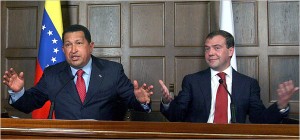This week, while much of the world was focused on Barack Obama’s tour of Europe and the Middle East, Venezuelan President Hugo Chávez was in Moscow doing his best to resuscitate the Cold-War tensions that led to the Cuban Missile crisis, which brought the US and Soviet Union to the brink of war. And he assured the Russians – who clearly welcome his willingness to provoke America – that, unlike Cuba, Venezuela would prove a far more worthy pawn.
Here, in a nutshell, is what he said:
Venezuela’s sovereignty is currently being threatened by the United States, which is plotting to invade our country.
If Russian military forces ever visited Venezuelan territory, they would be greeted by flying colors, drum beats and songs, as this means the arrival of our allies with whom we share the same view on the world.
 I have no doubt, however, that Russia sees Venezuela as nothing more than a rich market in which to peddle military arms. Of course, Russia is especially eager to do this in America’s backyard to counter the way America has been peddling arms in its backyard (e.g., in places like Poland and the Czech Republic) for years. Indeed, that’s why Russian President Dmitri Medvedev (right) sold Chávez on a strategic economic partnership instead of granting the military alliance he sought.
I have no doubt, however, that Russia sees Venezuela as nothing more than a rich market in which to peddle military arms. Of course, Russia is especially eager to do this in America’s backyard to counter the way America has been peddling arms in its backyard (e.g., in places like Poland and the Czech Republic) for years. Indeed, that’s why Russian President Dmitri Medvedev (right) sold Chávez on a strategic economic partnership instead of granting the military alliance he sought.
Never mind that, flush with cash from oil revenues, Chávez presented himself as just another fool looking to be parted with his money. In fact, as he was talking folly about forging a military alliance to take on the United States, the Russians were busy executing deals to supply Chávez with $5 billion worth of military hardware that they know will do nothing but grow moss dust in the Venezuelan jungle.
Frankly, Russia today is far more interested in reclaiming its Cold-War sphere of influence by flexing its economic muscles (e.g., by demanding extortionate rates for its natural gas) than by stoking military confrontation with the US – even by proxy.
Nevertheless, it seemed at least a provocative coincidence that Iszvestia reported on Monday that the Russian air force was planning to fly long-range nuclear bombers to Cuba on a regular basis.
But to make it clear to Russia that the US would respond to this bomber crisis just as it did to the 1962 missile crisis, here’s how General Norton Schwartz, nominee for air force chief of staff, responded on Wednesday to that report:
Russia would cross a redline for the United States of America if it were to base nuclear capable bombers in Cuba. I would certainly offer the best military advice that we engage the Russians not to pursue that approach.
However, there’s no greater indication that Russia wants no part in resuscitating Cold-War tensions in America’s backyard than the haste with which its defense ministry moved to deny Iszvestia’s report as “disinformation.”
Russia, out of its peace-loving policies, does not build military bases along the borders of other states.
[Defense Ministry spokesman Ilshat Baichurin]
Related Articles:
Chávez replaces Castro as America’s American enemy no. 1…
Tension rising between Mother Russia and former territories
Chávez: Bush is trying to kill me
America’s shrinking sphere of influence
Touché…!
Leave a Reply
You must be logged in to post a comment.